MSc Diplomacy & International Security
ApplyKey facts
- Start date: September
- Study mode and duration: MSc: 12 months full-time; 24 months part-time
Scholarships: Commonwealth Shared Scholarship, Humanitarian Scholarship for Displaced Palestinians & EU Engagement Scholarships available
Study with us
- deepen your understanding of contemporary and historical issues relating to diplomacy and security
- gain skills to design advanced research projects
- benefit from a unique multidisciplinary experience
The Place of Useful Learning
UK University of the Year
Daily Mail University of the Year Awards 2026
Scottish University of the Year
The Sunday Times' Good University Guide 2026
Why this course?
The MSc Diplomacy & International Security gives graduates from a range of academic backgrounds the opportunity to gain expertise in a vital area of international engagement. It will also appeal to professionals interested in moving into positions requiring a breadth of knowledge on diplomacy, history and security issues.
Diplomacy and international security are among the most pressing issues facing the world today. This programme is distinctive as it offers students a historical understanding of contemporary issues and enables them to develop an in depth knowledge of diplomacy. The programme examines key international security concerns and gives students the opportunity to engage with issues of vital relevance in today’s world.
This Masters programme offers a genuinely multidisciplinary experience. Drawing on the academic expertise in the Faculty of Humanities & Social Sciences, you'll be able to select classes from History, the School of Government & Public Policy, and the Law School.
The course has links with the Foreign, Commonwealth and Development Office, and the Consular Missions in Edinburgh. Students have the opportunity to engage with distinguished diplomatic and foreign policy practitioners who contribute to the programme.
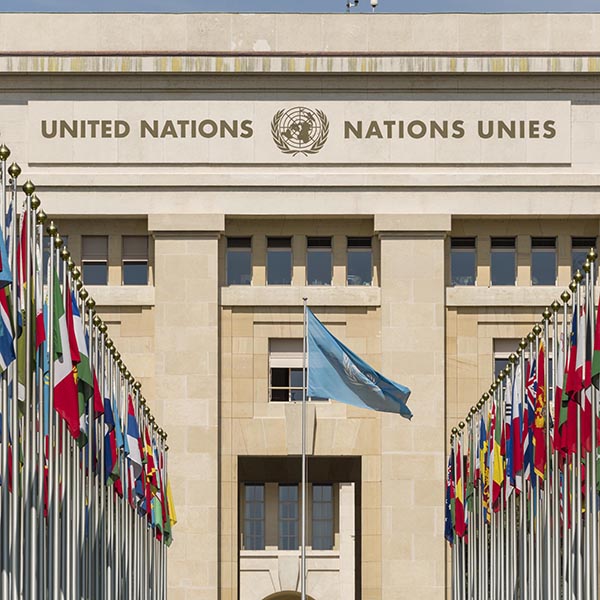

What you’ll study
The MSc in Diplomacy & International Security introduces and familiarises you with contemporary and historical issues relating to the course topics, examining them through historical, political and legal viewpoints.
The course is organised into core and elective classes. The core classes focus on the evolution and practice of diplomacy and will provide students with the research skills required. The opportunity to carry out an extended piece of original historical research and writing is provided in the form of the dissertation.
There are two core modules and you can select optional classes from each school. Your experience is further enhanced by learning alongside students from other disciplinary backgrounds.
Dissertation
MSc students also write a dissertation. You’ll research a topic of your choice, under the supervision of a member of staff.
Learning & teaching
This course is taught mainly through face-to-face teaching where class time is spent discussing and debating the weekly topic. Each class is delivered through two-hour weekly seminars, which students are required to attend.
Assessment
Assessment is conducted with a mixture of presentations, written assignments and exams that vary module by module
Hear from our students
Watch our video to find out a bit more about this course, and hear from some of our students on what they think about it.
"Students have met a number of ambassadors, diplomats, and security experts. We have links with the Foreign Office, the consular missions in Edinburgh, and embassies in London, Paris and Washington."
Dr Rogelia Pastor-Castro, Programme Leader.
Course content
Please note that the below is an indicative list of classes. These are subject to change.
Diplomacy: Evolution, Theory and Practice
This course provides an advanced study of the evolution of diplomacy. While giving an historical overview it asks questions throughout about the current relevance of various diplomatic practices such as the appointment of ambassadors and the elite nature of policy-making in the diplomatic field. The class will also discusses the broader issues about the definition and purpose of diplomacy.
Embassies in Crisis
Embassies are integral to international diplomacy, their staff instrumental to inter-governmental dialogue, strategic partnerships, trading relationships and cultural exchange. But embassies are also discreet political spaces. Notionally sovereign territory ‘immune’ from local jurisdiction, in moments of crisis embassies have often been targets of protest and sites of confrontation. It is this aspect of embassy experience that this class will explore.
Choose one module from the following three subject-specific research classes:
Research Skills, Sources & Methods
This class introduces students to methodological and practical issues in historical research. The class is designed to help you decide a research topic and a design that you will use for your dissertation. Topics covered include formulating research questions, developing concepts, and how to select cases to study.
Contemporary Security Challenges & Responses
The concept of national security expanded to incorporate not only ‘traditional’ threats from hostile actors, but a host of issues ranging from the impact of climate change, natural disasters, resource security and even recession. Security has become increasingly globalised and interconnected in threat and response while also increasingly recruiting the populace to be ‘secure citizens’. The relevant theories underpinning these developing trends will be examined alongside the key institutions and actors.
Britain, France & the United States 1945-1955 Diplomacy, Strategy & Alliance
This class explores the diplomacy of the post war world. It will provide students with a deeper and more nuanced understanding of the key international issues faced by Britain, France and the United States after the Second World War. Students will examine the issues which strengthened the post-war alliance and those which challenged it.
Contemporary International Relations
This class introduces students to the literature and research agendas related to conflict and cooperation in international relations studies.
We'll cover a wide array of approaches that relate to interstate and intrastate (civil) conflict, cooperation and other contemporary security topics such as post-conflict peace, peacekeeping operations, terrorism, and human rights violations.
Secret Intelligence: From the Cold War to the Global War on Terror
This module investigates the history of secret intelligence and international security from the Cold War to the global War on Terror. It looks at the development of intelligence services and their rivalry in the context of the Cold War. The course goes beyond the Western-centric narrative, to investigate the impact of the intelligence rivalry on the process of decolonisation and state-building in post-colonial societies. Moreover, it investigates the role of intelligence in counter-terrorism in historical context.
International Human Rights Law
Human rights protection is a global concern. This class examines civil and political rights along with economic, social and cultural rights, and assesses the range of international monitoring and supervision regimes. Topics covered include the major international treaties and bodies. It also looks at the challenges to human rights in transitional societies as well as the right to self-determination.
International Institutions & Regimes
The purpose of this class is to provide students with a comprehensive overview of the concepts and theoretical approaches central to understanding and analysing the role of international institutions and regimes in the contemporary world.
This class will survey a variety of international institutions and regimes, exploring how they shape global interactions in a number of cross-cutting issue areas such as security, trade, human rights and the environment. The overall analysis will contribute to the understanding of the theories, practices and processes through which global politics are organised, and to an assessment of the future of international institutions and regimes in global governance.
Diplomacy and Conflict Resolution in the Arab-Israeli Dispute, 1947-1979
The class surveys and analyses the changing nature of conflict management and resolution in the Arab-Israeli dispute, together with the range of conceptual tools that seek to explain the international activity in this region. The objective is to examine the relationship between the theoretical literature within the field of diplomacy and conflict resolution and specific case studies with a particular focus on the period from the 1947 UN Partition Plan to the brink of the 1979 Camp David settlement, realised under President Jimmy Carter.
The first part of the module will focus on the influence of the United Nations on the region and the establishment of Israel in 1948. Students will then explore the impact of the Cold War on the Middle East and the role of the UN in international conflict resolution. Then the course will examine the 1973 crisis management and the US-Soviet competition to become a unilateral peacemaker in the region. Students will then explore Henry Kissinger’s negotiation tactics, including shuttle diplomacy, step-by-step approach and hard bargaining. The latter part of the module will then focus on summit diplomacy with Jimmy Carter’s single-negotiating text approach and Camp David Accords as a case study.
The Global Cold War in Africa
This class introduces students to major debates in the history of the Cold War in Africa, especially focusing on the agency of Africans in international politics. The class is arranged roughly chronologically.
The opening weeks set out major themes of the course, such as the nature of African nationalism and the outcomes of decolonization, before moving onto debates about development, modernisation, and culture in the African context. The class then considers several thematic case studies, which explore the causes of war, and conflict resolution, in southern Africa before finishing off with a discussion of the repercussions of the Cold War for the African continent.
We'll look in detail at the decolonisation in British and French Africa, before looking in some depth at the upheaval in the Congo. We'll also investigate the ‘diplomacy of liberation’, employed by African revolutionaries from the Portuguese colonies and South Africa to achieve majority rule and independence; examine the onset of the civil war in Angola and the struggle against apartheid in South Africa.
While the course will deal with the policies of the Soviet Union and the United States in Africa, its main objective is to study the diplomacy, strategies and statecraft of Africans in the twentieth century and investigate their impact on the ‘Global Cold War’. Were Africans simply proxies of superpower competition or did they use diplomacy to their own advantage?
The class thus aims to assess the ways in which the Cold War affected the processes of decolonisation, nation-building and democratisation in Africa. It also studies the importance of the continent for the global struggles and transformations of the post-War era. The course also allows students to creatively engage with a growing body of secondary literature and documentary evidence.
Theory & Principles of Conflict Resolution
You'll learn about the theoretical and disciplinary sources underpinning conflict intervention to engage with the subject in a scholarly and critical fashion. The class straddles a wide range of topics and disciplines, like mediation itself.
Entry requirements
| Academic requirements | First-class or Second-class Honours degree, or international equivalent, in Humanities, Social Sciences, Languages, Law or other relevant discipline. |
|---|---|
| English language requirements | Please check our English requirements before making your application. |
Pre-Masters preparation course
The Pre-Masters Programme is a preparation course held at the University of Strathclyde International Study Centre, for international students (non-UK/Ireland) who do not meet the academic entry requirements for a Masters degree at University of Strathclyde.
Upon successful completion, you'll be able to progress to this degree course at the University of Strathclyde.
Chat to a student ambassador
If you want to know more about what it’s like to be a Humanities & Social Sciences student at the University of Strathclyde, a selection of our current students are here to help!
Our Unibuddy ambassadors can answer all the questions you might have about courses and studying at Strathclyde, along with offering insight into their experiences of life in Glasgow and Scotland.
International students
We've a thriving international community with students coming here to study from over 140 countries across the world. Find out all you need to know about studying in Glasgow at Strathclyde and hear from students about their experiences.

Interested in postgraduate study?
At the Faculty of Humanities and Social Sciences, our friendly and knowledgeable team will be available to provide you with all the information you need to kick-start your postgraduate journey at the University of Strathclyde. Register for upcoming events below:

Having produced the work during the pandemic, I sought out alternative ways of gathering information. That led me to register for oral history training with the Scottish oral history centre. Using the knowledge I gained, I sought out Black women in Nigeria’s and Britain’s foreign office and conducted oral interviews with them.
These interviews helped me represent the voices of Black women in diplomacy. I used the information I got from these women in addition to other primary and secondary sources to produce the work. I am proud to say that I was awarded a distinction for my dissertation.
Chinweuju Ezinwanne Nzewi
Fees & funding
All fees quoted are for full-time courses and per academic year unless stated otherwise.
Fees may be subject to updates to maintain accuracy. Tuition fees will be notified in your offer letter.
All fees are in £ sterling, unless otherwise stated, and may be subject to revision.
Annual revision of fees
Students on programmes of study of more than one year (or studying standalone modules) should be aware that the majority of fees will increase annually.
The University will take a range of factors into account, including, but not limited to, UK inflation, changes in delivery costs and changes in Scottish and/or UK Government funding. Changes in fees will be published on the University website in October each year for the following year of study and any annual increase will be capped at a maximum of 10% per year. This cap will apply to fees from 2026/27 onwards, which will not increase by more than 10% from the previous year for continuing students.
| Republic of Ireland |
If you are an Irish citizen and have been ordinary resident in the Republic of Ireland for the three years prior to the relevant date, and will be coming to Scotland for Educational purposes only, you will meet the criteria of England, Wales & Northern Ireland fee status. For more information and advice on tuition fee status, you can visit the UKCISA - International student advice and guidance - Scotland: fee status webpage. Find out more about the University of Strathclyde's fee assessments process. |
|---|---|
| Scotland, England, Wales & Northern Ireland | Full-time: £10,100 *Please note: Year 2 fee will be subject to an increase |
| International | £23,550 |
| Additional costs | International students may have associated visa and immigration costs. Please see student visa guidance for more information. |
| Available scholarships | Take a look at our scholarships search for funding opportunities. |
Please note: the fees shown are annual and may be subject to an increase each year. Find out more about fees.
How can I fund my course?
Scottish postgraduate students
Scottish postgraduate students may be able to apply for support from the Student Awards Agency Scotland (SAAS). The support is in the form of a tuition fee loan and for eligible students, a living cost loan. Find out more about the support and how to apply.
Don’t forget to check our scholarship search for more help with fees and funding.
Students coming from England
Students ordinarily resident in England may be to apply for postgraduate support from Student Finance England. The support is a loan of up to £10,280 which can be used for both tuition fees and living costs. Find out more about the support and how to apply.
Don’t forget to check our scholarship search for more help with fees and funding.
Students coming from Wales
Students ordinarily resident in Wales may be to apply for postgraduate support from Student Finance Wales. The support is a loan of up to £10,280 which can be used for both tuition fees and living costs. Find out more about the support and how to apply.
Don’t forget to check our scholarship search for more help with fees and funding.
Students coming from Northern Ireland
Postgraduate students who are ordinarily resident in Northern Ireland may be able to apply for support from Student Finance Northern Ireland. The support is a tuition fee loan of up to £5,500. Find out more about the support and how to apply.
Don’t forget to check our scholarship search for more help with fees and funding.
International students
We've a large range of scholarships available to help you fund your studies. Check our scholarship search for more help with fees and funding.
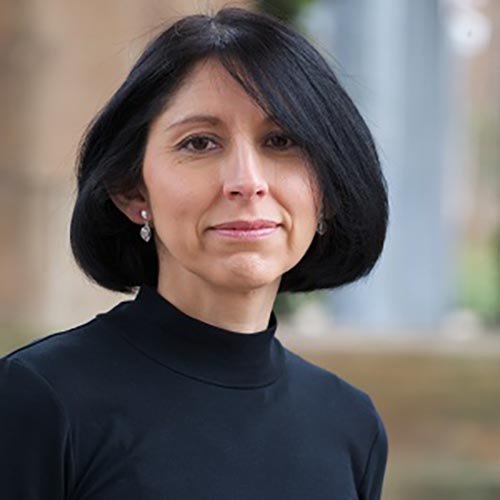
Diplomacy and international security are among the most pressing issues facing the world today. Success or failure can have huge implications for society as a whole. I am interested in bringing together academics and practitioners. This has led to many fruitful collaborations over the years and the opportunity to present my work at places like the Foreign and Commonwealth Office.
Programme leader
Faculty of Humanities & Social Sciences Scholarships
EU Engagement Scholarships are available to EU applicants who would have previously been eligible for Home (Scottish/EU) fee status.
The Humanitarian Scholarship for Displaced Palestinians
The Humanitarian Scholarship for Displaced Palestinians supports access to study at Postgraduate Diploma and Masters level courses, including the MSc Diplomacy & International Security, for Palestinian students who are facing financial and additional access barriers to study at this level.
Careers
The programme will equip students with the skills and knowledge to pursue professional careers in areas including:
- government (whether domestically or in supra-national organisations such as the EU or UN)
- non-governmental organisations
- international agencies
- journalism
- think-tanks
- law firms
The strong research focus means this course will also act as a route to advanced postgraduate study in:
- history
- politics
- international relations
- law
- security studies
For those who wish to pursue a career outside academia, this research component will be beneficial for various research and policy roles, and the public and third sectors.
Engagement with diplomats
Interaction with practitioners is an important aspect of the MSc Diplomacy and International Security course and gives students a real-life insight into their area of study.
Lord Ricketts’ masterclass
Lord Ricketts was National Security Advisor 2010 to 2012, and Ambassador to France 2012 to 2016. Previously he was Chairman of the Joint Intelligence Committee, UK Permanent Representative to NATO, and Head of the Diplomatic Service.
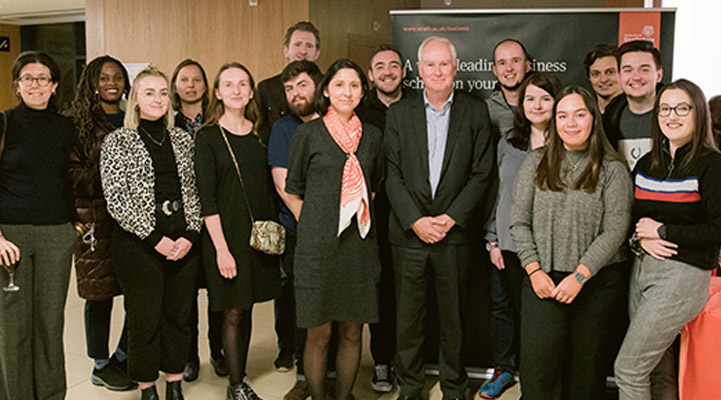
Students with Sir Mark Lyall Grant, UK National Security Adviser 2015-17, Ambassador and Permanent Representative, UK Mission to the UN New York, 2009 to 2015.
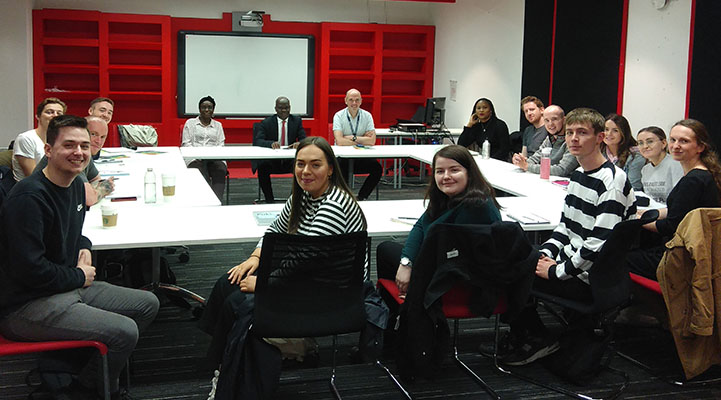
Students with His Excellency, Professor Cheikh Ahmadou Dieng, the Senegal Ambassador to the UK.
Our students
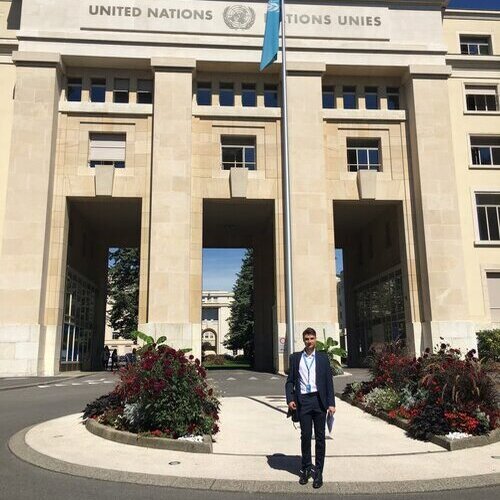
Povilas Lasdauskas
The best part of the course is that it allows you to choose between different disciplines such as History, Law and Politics. Which I believe are crucial to becoming an outstanding professional in the field.

Madison Silva
The specific classes that I took were not only interesting and thought provoking but challenging and really made me think outside of what I was used to. I enjoyed the passion of the professors within class and their willingness to engage in discussion with students during and after lectures. The friendships I have made within this programme have been extremely fulfilling and I know will translate.

Katie McLachlan
The fact that the course was offered as a multidisciplinary MSc really encouraged me to step out my comfort zone and study courses offered by different departments…Taking classes from multiple disciplinaries allowed for me to expand my knowledge and consider debates from different angles.

Kirsty O'Neill
The interdisciplinary aspect of the course means that you are encouraged to consider several different aspects of the subject you’re studying and encourages critical thinking when considering the historic foundations that influence present and future global issues.

Kyler Howsare
I have really enjoyed all of the guest speakers and people from the field that professors have been able to bring in to speak for us. It really helped me get an idea of the practical side of the field that I’m planning to enter.
Glasgow is Scotland's biggest & most cosmopolitan city
Our campus is based right in the very heart of Glasgow. We're in the city centre, next to the Merchant City, both of which are great locations for sightseeing, shopping and socialising alongside your studies.
Apply
Start date: Sep 2026
Diplomacy and International Security
Start date: Sep 2026
Diplomacy and International Security
Contact us
Prospective student enquiries
Contact a member of our team on LiveChat between 10am and 4pm (GMT)
Telephone: +44 (0) 141 444 8600
Have you considered?
We've a range of postgraduate taught and Masters courses similar to this one which may also be of interest.

Ross Mair
The course has been crucial in developing key skills that are commonly used in the workplace - organisation, independent research, communication and teamwork. It is through this course that I have been able to develop them. Using examples from this course that demonstrate my aptitude in the desired skills to employers has been central to my success in securing employment after I graduate.

